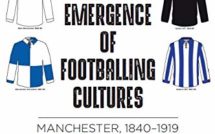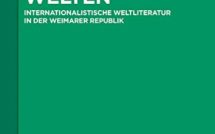

In this section of Campus, EuropeNow features a selection of scholarly articles and books on topics pertinent to the teaching of Europe or teaching in Europe that were published within the last 5 years. This dynamic bibliography, with monthly installments, seeks to highlight both pedagogy research as well as critical analyses of debates taking place in higher education in and about Europe.
If you are interested in reviewing any of the books featured in any of our Campus Round-Ups, please contact our Research and Pedagogy Chair, Hélène Ducros, at helene@alumni.unc.edu
1. Transnational Social Capital in Migration: The Example of Educational Migration Between Bulgaria and Germany
By Birgit Glorius
Focusing on student migration from Bulgaria to Germany, this article examines what types of social capital are accumulated, transformed and implemented through migration, who profits from the investment, and how. The empirical work consists of 60 narrative biographical interviews with migrants and returnees to Bulgaria. The research reveals that the accumulation and investment of social capital takes place throughout the migratory trajectory—starting well before leaving—and is embedded in a transnational social space. Transnational networks exist as family, peer and professional networks, and all of them have a specific meaning for the migrants. Family networks are naturally present; they provide bonding social capital and thus have a stabilizing function for the individual’s identity. Professional networks have a strongly bridging function, helping the young migrants to manage status transitions. After return the transnational social capital acquired during the migratory stay helps returnees to re-integrate and find their way into the Bulgarian labour market. It also encourages them to pursue activities which are meaningful for civil society development, or for innovative (social) entrepreneurship. Thus, transnational social capital helps migrants to align their biographical development to the future, considering the post-transformative environment of Bulgaria, thereby helping to manage transformative changes and supporting societal modernization processes.
Find the article in Social Inclusion here
2. Not Lazy, not Faking: Teaching and Learning Experiences of University Students with Disabilities
By Tanya Osborne
This study explores the learning and teaching experiences of 105 disabled students mostly based in England, but with international voices. Students with disabilities are under-represented in universities and tend to have worse post-degree outcomes despite similar attainment rates to their peers. This presents a social justice issue. This article focuses on classroom experiences of these students. Using a survey with qualitative and quantitative elements, students were asked to give details about their experiences in taught settings, about their relationships with academic staff, and about their aspirations. Their responses have been analysed thematically and have been discussed in the context of the discourse around epistemic ignorance and social justice. The study finds that students may feel concerned about anonymity in disclosing disabilities and may be concerned about the way that others perceive them. The study finds that students perceive academic staff as often improperly trained for inclusive teaching.
Find the article in Disability & Society here
3. Possible Selves and Higher Education: New Interdisciplinary Insights
Drawing together example studies from international contexts, this edited collection provides a new and cross-disciplinary perspective on the concept of the possible self, exploring its theoretical, methodological and empirical uses with regards to Higher Education. Building on research which examines the ways in which possible selves are constructed through inequalities of class, race and gender, the book interrogates the role of imagined futures in student, professional and academic lives, augmenting the concept of possible selves, with its origins in psychology, with sociological approaches to educational inequalities and exclusionary practices.
Offering a broad and diverse examination of how concepts of our future selves can affect and limit educational outcomes, this book furthers the sociological dialogue concerning the relationship between individual agency and structural constraints in higher education research. It is an essential and influential text for both students and academics, as well as anyone responsible for student services such as outreach and widening participation.
Find the book at Routledge here
4. What Does ‘Active Citizenship’ Mean for Erasmus Students?
By Irina Golubeva, Elena Gómez Parra, and Roberto Espejo Mohedano
Since ERASMUS (European Region Action Scheme for the Mobility of University Students) was launched there has been a constant debate about the civic significance of this mobility programme. The purpose of this article is to analyse the understanding of active citizenship by Erasmus students. In order to discover Erasmus students’ perceptions, values, beliefs and attitudes regarding the issue under discussion, original data were collected from 174 students who participated in our survey in March 2014. By applying a statistical analysis, the most and the least important criteria for being considered an active citizen have been extracted from the answers of our respondents. In addition, we studied their attitudes towards and knowledge of the European Union (EU). We found that their understanding of ‘active citizenship’ echoes with the definition of the concept provided in the research literature.”
Find the article in Intercultural Education here
5. Academic Integration of Chinese Students in Finland and Germany: A Comparative Perspective
By Hanwei Li
It has been recognized that international students studying in non-Anglophone countries face more challenges in integrating into local higher education institutions for a number of reasons, such as the local language barrier and cultural differences. This study aims to understand the challenges and coping strategies of academic integration in non-Anglophone countries from the students’ perceptive, taking Chinese students as an example and using a qualitative approach based on semi-structured interviews with 58 Chinese students in Germany and Finland. It shows that, despite learning environment differences between Finland and Germany, Chinese students face similar challenges, including individual ones, such as the mismatch between their academic background and learning requirements, or contextual ones, such as a lack of consideration for international students in the pedagogical approach and curriculum design adopted by the host higher education institutions. The results challenge the existing stereotype of Chinese students and present evidence of students’ resourcefulness in generating novel approaches to develop their learning capabilities. It also shows that traditional learning techniques may be used as pathways to achieving deep learning and understanding.
Find the article in Frontiers of Education in China here
Published on August 4, 2020.




